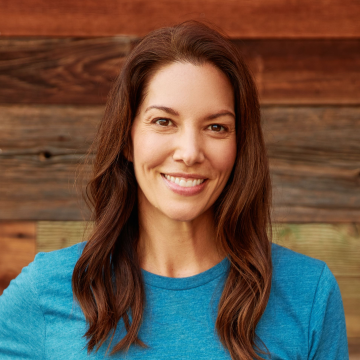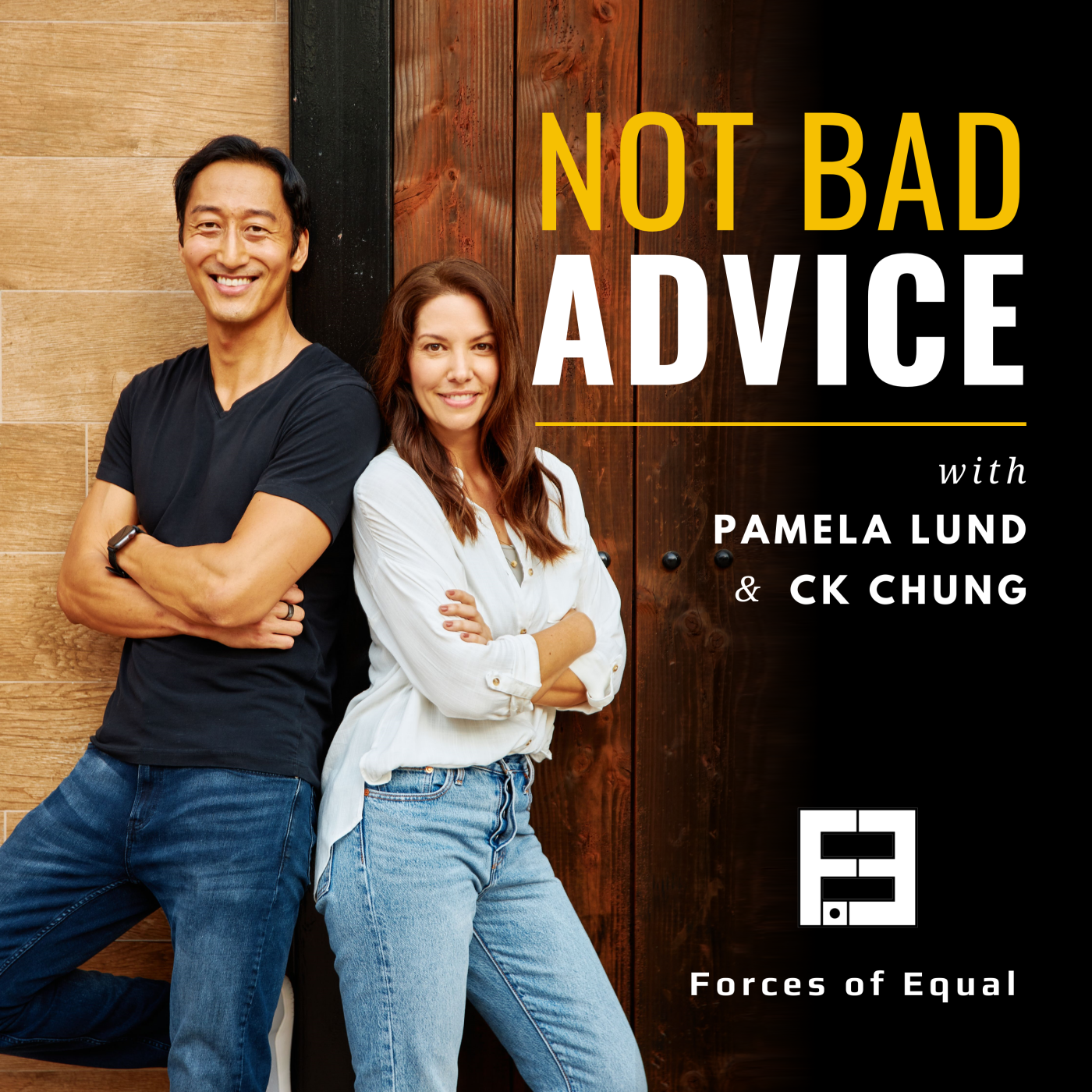Do you wonder where your money goes every month? Do you beat yourself up when you buy things you can’t afford or didn’t plan to buy? Do you buy things to deal with feelings, like loneliness or stress?
You’re not alone.
The way you spend money is deeply tied to your emotional state, how satisfied you are with your life, your self-confidence, and almost anything else going on in your life.
Learn how to be mindful of why you spend money, how to stop feeling guilty about it, and how to plan for the unplanned so you can stop using credit.
Ready to feel like you’re not bad with money? Visit NotBadWithMoney.com to learn about our financial coaching service that’s mostly practical and a little magical.
Got something you need advice about? Ask us here: ForcesOfEqual.com/Advice/
Transcript
Pam: [00:06] You’re listening to Not Bad Advice, where our goal is to offer perspective that helps you improve one aspect of your life at a time.
[00:13] I’m Pamela Lund.
CK: [00:20] And I’m CK Chung.
Pam: [00:21] And and we hope that after listening you’ll think, “Hey, that’s not bad advice!”
[00:25] We are halfway through our series of episodes on money and budgets. If you haven’t listened to the previous episodes about uncovering your financial values, rewriting your money stories and changing how money makes you feel, listen to them after you finish this one. They’ll help you put what we talk about today into practice.
[00:56] As with all of our episodes, the advice you hear can be used on its own right away, but if you’re ready for more, we’re also accepting new clients for Not Bad With Money Coaching, a one-on-one personalized money and budget coaching program that will help you feel calmly in control of how money flows through your life.
[01:13] Visit NotBadWithMoney.com or click the link in the show notes if you’re ready to feel like you’re not bad with money.
[01:18] Over the last few episodes, we’ve taken you on a journey through discovering how money makes you feel, what your financial values are, and what money stories are holding you back. Next week, we’re going to shift out of talking about mindset and get into the nitty gritty of actually setting up and using a budget to feel calmly in control of your money. But before we do, we need to talk about mindfulness.
[01:47] Mindfulness is a buzzword that gets tossed around a lot. That’s for good reason. Being mindful is the first step in creating meaningful change. If you’re not in tune with what’s really happening, you can’t take action that will achieve the results you want.
[02:01] If you’re not mindful, you will try to change the wrong thing or change things in the wrong way, because you don’t know where the root of the issue is. And this is true with everything, and that includes money.
[02:14] Being mindful about money doesn’t mean thinking about how much you have or don’t have. It doesn’t mean thinking more about your bills. It doesn’t mean checking your accounts 10 times a day. It doesn’t really mean thinking about money itself at all.
[02:29] Being mindful about money, means being aware of your needs and how spending fulfills them. It means being aware of your habits, patterns, and triggers so that you can work with them instead of fighting your tendencies. Essentially, money mindfulness means being consciously aware of how you engage with money.
[02:49] Using a budget is usually one of the first steps people take to get control over their finances. But without doing the mental and emotional work of really connecting with their money patterns, they end up just tracking money in and money out without ever changing their behavior.
[03:04] And you might be able to meet a financial goal by just tracking money in and out, but you won’t get over the anxiety, stress, guilt, shame, or whatever other emotions you feel about money. You might even end up right back where you started after a while, because you never address the underlying issues that got you there in the first place.
[03:23] Because the way you spend money is deeply tied to your emotional state, how satisfied you are with your life, your self-confidence and almost anything else going on in your life at the time, it can be affected by how well you slept the night before, if you’re feeling neglected, lonely or unworthy, and even how hungry you are.
[03:42] We buy things to fulfill needs and our needs are constantly changing. So we have to learn to be consciously aware and mindful at all times.
[03:53] I’ll be honest. This can be a little hard to do at first because you have to develop a habit of remembering to check in with yourself before you make unplanned purchases. So let’s break down the two important parts of that sentence – that you have to develop a habit and that you make unplanned purchases.
[04:11] So first, developing habits is hard. We talked about it on this show and there are tons of books dedicated just to that topic. But there are things that make it easier.
[04:21] CK, do you remember the four phases of the habit loop from atomic habits by James Clear?
CK: [04:28] Let’s see, there’s the cue, then the craving, then your response, and then the reward. So the cue triggers the craving, which initiates the response, which is associated with the resulting reward. So you need those four steps, cue, craving, response, reward for something to become a habit.
Pam: [04:52] Right. So how do we make mindfulness about money a habit using those four phases? Well, your cue is whatever makes you want to buy things, like seeing an ad or going to your favorite store website, and that creates a craving for new stuff. Your response before would be to buy it and your reward would of course be to have the new stuff.
[05:15] But there’s also another reward because not all rewards are positive. You will get the reward of feeling however you feel about spending money that you didn’t mean to spend. Feeling strong feelings, even if they aren’t considered positive, still rewards your brain with feedback. So feeling bad about buying things won’t actually stop you from doing it.
[05:38] So we need to hijack your thought process at the craving stage, so you create a new response. And the best way to do this is by using a budget. Whenever you’re about to buy something you hadn’t planned to buy, you enter the expense first in your budgeting app, and then make that the cue to be mindful of what you’re doing.
[05:58] So when you’re then mindful of what you’re doing, you can ask yourself things like, “what need am I trying to fulfill by buying something?” Or, “What emotions am I feeling that are making me want to buy things?”
[06:11] ” Will buying this actually fill the need I have, or is it a band-aid?” Or, ” What was my desire to buy this thing? Was it influenced by advertising? How will I feel tomorrow if I buy this today?” Or, you know, whatever gets you in tune with yourself.
[06:28] And if you check in and decide that you still want to make the purchase, that’s cool. You enter it in your budget and you go for it. But if not, that’s also cool. Keep the money where it is in your budget and go on with your day, but make sure you processed your mindful check-in enough that you don’t feel like you’re denying yourself.
[06:48] If you do feel like you’re denying yourself, you’ll be more likely to buy something else unplanned later. So, this is why being mindful has to be an ongoing and constant practice. But the cool thing is that over time you start to develop a new reward for your awareness habit, because the reality is you buy stuff you weren’t planning on, or didn’t really want at the expense of the stuff you actually do want, but have been denying yourself.
[07:15] So when you stop buying impulse stuff or stuff to fulfill some other emotional need and start to consciously plan to buy the stuff you really want, you get rewarded by having the stuff you really want, instead of the stuff that you regret buying.
[07:31] Okay, so we need to go back to the original statement now, which was what we started with, which was: you have to develop a habit of remembering to check in with yourself before you make unplanned purchases.
[07:43] So we talked about developing the habit of checking in. So let’s talk about the unplanned purchases part. If you are budgeting realistically and intelligently, and you’re being mindful about how you engage with money, you shouldn’t actually have that many unplanned purchases because unplanned purchases are actually totally foreseeable.
[08:05] Really. For example, most of my “air quotes” unplanned purchases are clothes. So I’ve developed my awareness about that, and I do my mindful check-in before I go into my favorite stores, so I know why I’m feeling compelled to shop.
[08:22] I just did this on Saturday. I was going to the grocery store, and I know that one of my favorite boutiques is like five minutes away from the grocery store that I was going to, and I was like, “Oh, you know, we’re going to do a photo shoot, and I want some new clothes.” And I was planning on going over to that boutique. But then I realized that I just wanted to shop. Like, I don’t actually need any new clothes.
[08:44] I was just having that craving for shopping, and I wasn’t planning on spending. So I did my mindfulness check-in, but because I budget money every month for these clothes, with no specific items in mind, if I do see something I want to buy, I can do it without sabotaging my goals. And if I don’t spend the money, that’s great. It’s there for something else.
[09:05] So this weekend I could have, without sabotaging my budget, gone and bought clothes. But, I didn’t need them. There wasn’t something I specifically wanted. It was just an urge to fill some other need that wasn’t actually related to clothes.
[09:19] And of course it doesn’t have to be clothes. It can be whatever you pretend like you’re not going to buy when you go on a budget, but you always end up buying anyway. Maybe it’s eating out, shoes, or books, or whatever your thing is. It doesn’t matter what it actually is.
[09:35] When you’re realistic and honest about your budget, you build in unplanned, but totally predictable purchases, so your budget works for you and who you are rather than some fantasy version of yourself that you will never sustain, pretending to be.
CK: [09:52] What about things that are irregular or semi predictable, like travel for a friend’s wedding? Or what if there are things you don’t want to buy, but have to when something goes wrong, like if your car breaks down or you need a new computer.
Pam: [10:06] Well, those things are inevitable. We spent a lot of money going to friend’s weddings over about a five-year span. And for most of these things, it’s a matter of when they happen, not if. So you can totally plan for them, which means they’re no longer unplanned.
[10:21] If you have something that could break down, eventually it will. If you have friends that want to get married, eventually they will. These are the kinds of things that most people miss when they use a budget, though, because they don’t think about planning for the unplanned, but one big unplanned expense can wipe out even a robust emergency fund, putting you back in danger of getting into debt.
[10:43] So planning for them just means setting aside a little bit of money every month, earmarked for these unplanned, but inevitable events that you know will happen at some point. And when they do, you’ll be ready and won’t have to put the expense on a credit card.
CK: [10:58] So like having a slush fund.
Pam: [11:00] Well, it is a slush fund, but you specifically earmark this money for the specific purpose. So if you have a friend that is getting married, you put a budget line item in your budget that is like “Joe’s wedding,” and maybe it’s happening a year from now. So you put aside a 12th of what you will need for that travel every month to build up your fund for that specific, irregular – and, you know, maybe it’s going to happen, you know, maybe the wedding won’t happen and you won’t end up actually needing the money. But it’s better than, ignoring that it’s going to happen, and then the month before putting a flight and hotel on your credit card.
[11:41] And this is an integral part of having a budget that does more than just track what you spend. But like I said, it’s not something that most people do. So we’re going to tell you how to set up a budget that actually works and how to plan for the unplanned in our next two episodes.
[11:56] So let’s transition to the part of the show where I pull an Oracle card to offer a visual that relates to the message of the show because having a visual makes it easier to remember what you learned.
[12:31] And we’re changing up this part of the show this week to try something new. In previous episodes, I shuffled the deck and pulled a card on the fly to do an authentic, intuitive interpretation. But recently I’ve been feeling like the visual of the card will be more powerful for you and resonate more if I choose a card that more directly applies. So we’re going to try that for awhile. If you have feedback either way, let us know what you think by reaching out on Twitter.
[12:56] Okay. As always the deck I’m using is the Nocturna Oracle deck from the creeping moon. And the card for today’s message about spending consciously and planning for the unplanned is the coral snake. The new world, coral snake has one of the most potent venoms of all snakes found in North America.
[13:20] Now, the reality is that there are very few instances of coral snakes, biting humans, because they’re very reclusive, but for our purposes, we’re going to think about them as a danger to you. These snakes have banded colors of red and black and yellow. And the yellow is what makes their coloring unique among other red and black snakes that aren’t venomous. So there’s a saying that goes red and black, friend of Jack, red and yellow, kill a fellow.
[13:47] So the idea to connect here is that when you know what to look out for and are being mindful and aware, you can avoid danger. You can see the yellow bands that indicate danger and course-correct to avoid being bitten. You can look ahead on your path and see the expenses that will be dangerous if you don’t plan for them now. You can start planning and change your course, so you don’t get bit by something you could avoid.
[14:14] If you want guidance through the process of unpacking your money stories, learning to spend consciously, and setting up a budget that actually works, don’t forget to visit NotBadWithMoney.com to learn about our money coaching service that combines practical and intuitive advice. Just like this show.
[14:33] And if you found yourself thinking, “Hey, that’s not bad advice,” while listening today, share it with a friend that needs a budget.
[14:39] You can get in touch with us on Twitter, where I’m @Pamela_Lund and CK is @cKdisco. If there’s something you need advice about, visit ForcesOfEqual.com/Advice where you’ll find a form that you can use to get in touch. Both links are in the show notes.






